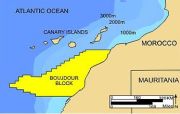There's one Arab Spring protest you have probably never heard of. No, it's not Egypt, Tunisia, Libya or Syria - all of which have received thousands of reels of coverage on your TV. It's not even the 'silent protests' in Bahrain, Algeria, Jordan, Oman and Saudi Arabia - where forces more powerful than those of the protesters suppressed the brief flickers of dissent before they took hold. No, I am talking about the people of Western Sahara, the Sahrawis, who have been ruled by the Moroccans since the mineral rich region was annexed in 1976.
If you are not familiar with Western Sahara that is hardly surprising; the struggle of these few hundred thousand people on the west coast of Africa receives almost no coverage in the media. Yet the region is defined by the UN as a "non-self-governing territory", with a distinct language and defined space. Numerous international law rulings have declared the continued occupation by the Moroccans illegal, leading to the region being dubbed 'Africa's last colony'.
Western Sahara is divided by a 1,500 mile wall, the largest in the world, complete with barbed wire and mines and maintained by Moroccan troops. The Moroccan authorities consider any opposition to their rule in Western Sahara as an attack on the country's "territorial integrity" so pro-independence forces are often brutally supressed. Human Rights Watch has repeatedly warned that Moroccan forces "use a combination of repressive laws, police violence, and unfair trials to punish Sahrawis who advocate peacefully in favor of independence or full self-determination for the disputed Western Sahara."
The people of Western Sahara have not been oblivious to the Arab Spring. In February and March, partly inspired by the toppling of Mubarak and Ben Ali, thousands of Sahrawis protested on the streets against Moroccan rule. This Tuesday there will be protests across the world to mark the 20th anniversary of the ceasefire between the Moroccans and the Polisario, the Sahrawi rebel national liberation movement. As part of that ceasefire the Moroccans promised a referendum on self-determination, yet the Sahrawis are still waiting.
What has this got to do with Libya? Last week the new 'liberal' government of Libya, the National Transitional Council, announced it no longer supported an independent Western Sahara. Colonel Gaddafi had, albeit inconsistently, pledged Libyan support for the Sahrawis' struggle for recognition. Now the NTC has quietly backed the Moroccans as the true and legitimate rulers of the region.
This must be recognised as hypocritical. The NTC came to life as a movement fighting for independence from Colonel Gaddafi and, most importantly, the right to democracy. When Gaddafi was set to retake Benghazi, it urged the West to act based, on these same liberal democratic principles and the right to self-determination. In March, the movement's spokesperson, Mustafa Gheriani, said that "the revolution was started because people were feeling despair from poverty, from oppression. Their last hope was freedom." Now they have assumed control, they have refused to back the legitimate demands of the Sahrawis for the same rights.
The reasons for this shift are based on regional alliances - the NTC leaders have fallen out with the Algerians because they have so far refused to recognise them as the legitimate government of Libya. The Algerians have always supported an independent Western Sahara, in part at least to aggravate the Moroccans. Therefore the NTC has made the calculated decision that to state their support for Moroccan control of Western Sahara they will bring the country on side and isolate the Algerians. It is also partly because there have been claims, largely unverified so far, that members of the Polisario were employed by Colonel Gaddafi as mercenaries to put down the protests in Libya.
Yet how alarming it is that one week into Libya's new administration 'real-politik' is already the name of the game. Even if it were the case that people affiliated with the Polisario were involved in Libya that does not mean that the Sahrawi's right to self-determination should be so summarily dismissed.
If it really wants to reshape North African politics, the NTC should be supporting the struggle of a people in a nearby region illegally suppressed by an occupying power. Instead it has put its own local and strategic interests. The National Transitional Council's stance on Western Sahara seriously undermines its claims to be in favour of national self-determination in the region. So much for the new liberalism of the Middle East.
Follow Joe Dyke on Twitter: www.twitter.com/joedyke








